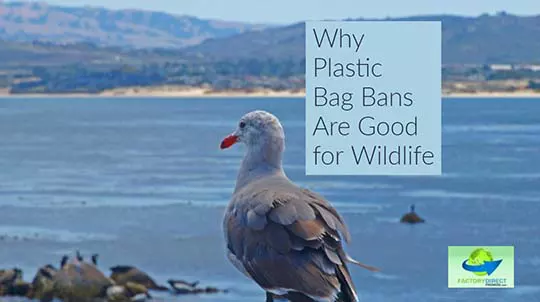Why Plastic Bag Bans Are Good for Wildlife

Understanding How Disposable Products Impact Ecosystems
Plastic bag bans are becoming more and more commonplace throughout the United States. Many cities, counties and even states are discussing passing such bans. Each municipality that passes a plastic bag ban has their own reasons. As a big part of their impetus to pass a ban, many cities cite the damage that litter from single-use plastic bags does to local ecosystems. We already covered how plastic bags hurt wildlife, so now we will cover why plastic bag bans are good for wildlife.
The Reality of Disposable Plastic Bags
Single-use plastic bags are likely to end up as litter. A series of factors impact this likelihood. Most recycling facilities do not accept disposable plastic bags; making it difficult for consumers to get rid of their bags. Many large chain grocery stores accept used disposable plastic bags for recycling, but these programs are often under promoted.
Without a viable way to get rid of single-use bags, many consumers throw them away or toss them in the recycling bin. The lightweight design makes it easy for a gust of wind to carry the bags away from garbage cans, recycling bins or landfills, so even if people are not purposefully littering, when it comes to plastic bags anything is possible.
Impact on Wildlife
Trash is a major risk to animals who can easily mistake discarded plastic bags as food. When animals ingest plastic trash or become entangled in it, the animal is at a serious risk of death. When there is less litter there is less of a threat to animals and their habitats.
Eliminating the Threat
Plastic bag bans eliminate the litter and resulting problems by getting rid of disposable plastic bags. When consumers are not given single-use bags at the checkout they are not faced with disposing of them, which in turn means there is less litter. Plastic bag bans take some getting used to, but many shoppers easily adjust and their communities are cleaner because of it.
Finding Eco-Friendly Solutions
Plastic bag bans are good for wildlife, but they can complicate matters for shoppers. Reusable shopping bags fill the void left by disposable plastic bags. The durable construction of reusable bags enables them to be used for many years and these bags can often be recycled when they show signs of wear and tear, so as to not damage ecosystems and endanger wildlife.
Learn About the Movement
Banning plastic bags reduces litter and is a good solution for protecting wildlife and their habitats. Plastic bag bans are definitely a change, but it is a change for the better than many shoppers easily pick up. If you want to learn more about efforts to pass plastic bag bans, check out our plastic bag ban map. This interactive map follows efforts around the world to ban disposable plastic bags and allows you to easily search for bans in chosen locations.
Let us know in the comments if you know of any locations missing from our map. Stay in the know about green news, our latest eco specials and more when you sign up for our newsletter.
Tagged




